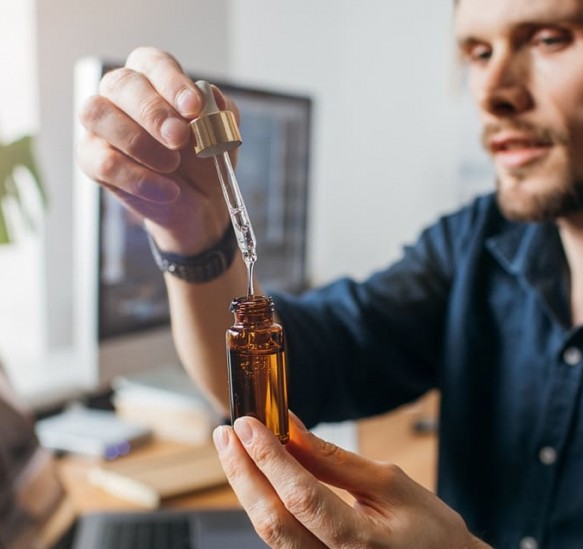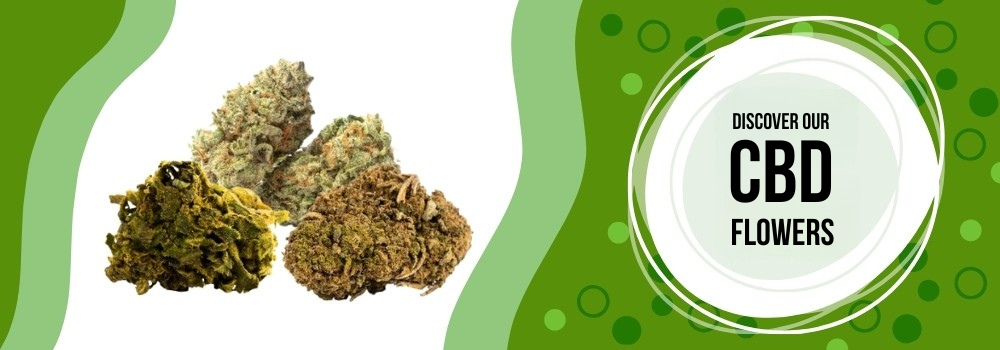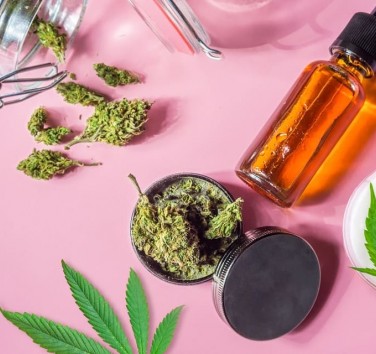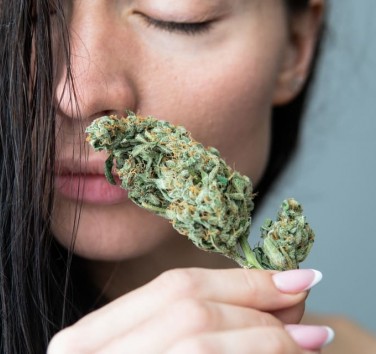Sommaire
- How long does CBD stay in the body?
- The different modes of consumption
- CBD elimination, a process that varies from person to person
- Is CBD detectable in urine and saliva tests?
- How to find the dosage of CBD that suits you best?
- Can CBD interact with medications taken at the same time?
- Average duration of CBD elimination: Scientific studies and recent research
- Limits and variations of results
- Differences in elimination times: CBD vs THC
- Difference in Elimination Time: CBD Hashish vs CBD Herb
Indeed, the absorption and elimination time of CBD depends on the quantity you have consumed, the level of CBD, the method of administration, your weight, and your metabolism. Even when the effects have worn off, CBD is still present in your body, but the duration varies greatly from one individual to another.
As a result, the same amount of CBD and the same method of administration can give different results on each person. Either way, you want to know how long CBD stays in your body. You are planning to take a break, change your consumption pattern or increase doses, and you would like to understand the CBD elimination process. All the answers to your questions regarding the elimination of CBD can be found in this article.

How long does CBD stay in the body?
According to scientific studies carried out on this subject, CBD does not remain in your body for more than 7 days after your last consumption. That said, this duration varies depending on certain factors. For example, frequent users, who take more than 10 mg of CBD each day, may take more than 2 weeks to eliminate it. For occasional consumers, CBD is almost undetectable after a week. If it is a single consumption, CBD can even be eliminated in a single day.
Even if on average, it takes around 7 days for the CBD to be completely evacuated from your system, you must understand that this figure simply depends on several elements, know:
- your age;
- your metabolism;
- your weight;
- how often you consume CBD;
- the amount of CBD you took;
- and above all, the mode of consumption.
The different modes of consumption
An interesting element to note is the notion of "half-life" linked to the elimination of substances from the body. Typically, a substance requires approximately 5.5 half-lives to be completely expelled from the body. For CBD consumed orally, this means it could be completely eliminated from the body within 11 to 28 days.
However, a blood test may no longer detect it well before this time. If CBD is vaporized or smoked, its half-life in blood plasma is considerably shorter, lasting only hours. Additionally, it is essential to understand that regular CBD users might require a longer period of time to fully eliminate the substance from their system compared to those who consume CBD occasionally or for the first time.
CBD orally
If you consume CBD oil, capsules, or edibles, you must wait for the cannabinoids to pass through your digestive system to feel any effects. CBD must pass through the gut and liver before reaching the bloodstream, so the relaxing effects can take 30 minutes or more to appear. When consumed orally, CBD has a half-life of 2 to 3 hours, meaning the onset is slow, but the effects can last for several hours. Eliminated by the kidneys or the lymphatic system, CBD ingested orally can be evacuated in a few hours or a few days.
CBD oil sublingually
When you put a few drops of CBD oil under your tongue, the cannabinoids are absorbed by the mucous membranes and capillaries of the mouth. As a result, CBD is found very quickly in the bloodstream. Unlike oral consumption, sublingual consumption allows you to obtain relaxing effects in just a few minutes. Depending on the dosage, the half-life of sublingual CBD ranges between 1 and 10 hours. In other words, CBD consumed this way rises and falls almost as quickly.
Inhaling CBD flowers and resins
Inhaling flowers or resins remains the fastest means of absorption, because the lungs transfer CBD directly into the bloodstream. Eliminated through urine, inhaled CBD does not remain in the body for long with this method of administration. It is absorbed quickly, but the effects are not as long-lasting as with the methods mentioned above. The half-life of inhaled CBD is 1 to 2 hours after consuming a dose of approximately 20 mg.
Skin application of CBD cream
CBD-based creams can be applied locally for various reasons: an insect bite, a burn, a cellulite problem... When CBD is applied directly to the skin , it almost never reaches the bloodstream. It enters the skin via the transfollicular route, then accumulates in what is called the sebaceous gland, the organ responsible for secreting sebum. This is why the soothing and anti-inflammatory properties remain localized in a specific location, and do not spread throughout the body. It is possible that a tiny part of CBD ends up in the bloodstream, but for this, it must pass through the 7 layers of the epidermis. Absorption through the skin is slow, and the effects are evident between 30 and 45 minutes. After a few hours, it completely disappears from your body.
CBD elimination, a process that varies from person to person
The bottom line is that CBD works very differently from one person to another. Beyond the mode of consumption, you must always take into account physiological variables to approximately determine the absorption and elimination time of CBD.
- Your weight: The heavier a person is, the more they need a large amount or a high dosage of CBD to feel effects. This explains why a 60 kg woman can experience more powerful effects than a 100 kg man for the same quantity, form and level of CBD.
- Your metabolism: Each person has a different metabolism. Some people spend and consume more quickly, and therefore need a higher and more frequent quantity to fully benefit from the benefits of CBD.
- Your experience: Of course, people who consume CBD regularly do not feel the same effects as when they first took it. The body gets used to the effects and feels them in a lighter way. This is why it is essential to start with the smallest possible dose and gradually increase it.

Is CBD detectable in urine and saliva tests?
When we talk about eliminating CBD, it is often for fear of detection in a drug test, when CBD is not. a. First of all, saliva tests carried out during a police check aim to detect the presence of THC (tetrahydrocannabinol) in your body, since this is the molecule responsible for the psychoactive effects of hemp. So, you can be reassured, because no, CBD is not detectable in the saliva test. Although consuming CBD before driving is not prohibited, it is not recommended. Indeed, CBD can lead to a state of relaxation and drowsiness which does not go well with driving.
How long does CBD stay in urine?
The detection of CBD in urine mainly depends on the frequency of consumption. For occasional use, CBD can be assimilated in just two hours. On the other hand, for occasional or regular consumption, CBD can remain detectable in urine for a period of 2 to 5 days. In comparison, THC, another cannabinoid found in cannabis, requires more time to be eliminated from urine. Indeed, THC can be detectable between 30 days to 77 days, depending on different individual factors.
Regarding urine tests, scientific studies have shown that it is quite rare to find CBD in urine, but it is still possible. In 2016, an American study was carried out on this subject on 15 participants. They all consumed products rich in CBD before taking a urine test. 2 hours after consuming these products, 14 out of 15 participants tested positive. 24 hours later, the CBD was no longer detectable and thus, all participants were negative in the urine test.
How long does CBD stay in the blood?
When you consume CBD, cannabinoids circulate in your blood. However, it is important to note that a blood test is often ineffective in detecting CBD because its presence in the blood is short-lived. Typically, CBD remains detectable in the blood for only a few hours, usually between 3 and 5 hours after consumption. Regarding THC, its detection in the blood can last longer, between one day and three days, depending on the individual characteristics of the consumer.
Ultimately, we can say that single or occasional use CBD does not stay in your system for more than a week in your bloodstream, and barely 24 hours in your urine, even with a high dose. However, regular consumers will have to wait 7 to 15 days to see the CBD completely eliminated from their body, since cannabinoids accumulate in the blood and fats. It all depends on the method of consumption, the quantity and your physiological predispositions.
How to find the dosage of CBD that suits you best?
After understanding the concepts of absorption and elimination of CBD, you are probably wondering what dosage is really right for you. To find the right dosage, you just have to experiment. For example, if you are looking for quick effects, you will surely prefer sublingual oil or inhaled flowers. Depending on your weight and experience level, a small amount may already be enough to give you powerful effects.
Can CBD interact with medications taken at the same time?
Yes, CBD can have drug interactions that can affect its elimination time. Certain medications, due to their mechanism of action or their effects on the liver, can slow or accelerate the metabolism of CBD.
So when CBD is taken in combination with certain medications, the time it takes for it to be completely eliminated from your system may be extended or shortened.
While these interactions may not always negatively impact your health, it is crucial to consult your doctor to ensure that taking CBD is compatible with your other medication treatments, especially if you are considering regular or long term.
Average duration of CBD elimination: Scientific studies and recent research
In the field of scientific research, several studies have been carried out to determine the average duration of elimination of CBD in the body. These studies provided important data to better understand the CBD metabolism process and its clearance.
A study published in the Journal of Clinical Pharmacology examined the elimination of CBD in healthy subjects. The results showed that CBD had an elimination half-life of approximately 18 to 33 hours. This means that the amount of CBD in the body decreases by half in this time interval. This study also noted that CBD clearance was faster in subjects with a higher body mass index.
Another research, published in the Journal of Drug Metabolism and Pharmacokinetics, analyzed the pharmacokinetics of CBD in patients with epilepsy. The results indicated that the time required to completely eliminate CBD varied between 1 and 2 days, with an average of approximately 1.4 days.
It should be noted that the duration of CBD elimination may vary depending on several factors, such as dose administered, frequency of use, method of administration, individual metabolism and other physiological variables .
These recent studies and research provide general estimates for the average duration of elimination of CBD from the body, but it is important to understand that each person may react differently.
Limits and variations of results
When discussing the results obtained regarding the average elimination duration of CBD, it is important to highlight the limitations and possible variations. Scientific studies provide general estimates based on populations of individuals, but there are individual factors that can influence results.
First of all, it is essential to recognize that each person is unique, with their own metabolism and physiological characteristics. Therefore, the way each individual processes and eliminates CBD may differ, leading to variations in elimination duration.
In addition, the administered dose of CBD can also play a crucial role. Studies provide data based on specific doses used in research, but in reality, people can consume varying doses of CBD, which can impact elimination time.
The method of administration of CBD can also influence the duration of elimination. For example, if CBD is consumed orally in capsule form, it may take longer to be metabolized and eliminated compared to a sublingual or inhalation method of administration.
In addition, other factors such as age, body weight, level of physical activity, general health, and concomitant use of other medications can all impact how well which the body metabolizes and eliminates CBD.
It is therefore essential to recognize that the results of studies on CBD elimination duration provide average estimates, but individual variations and specific circumstances must be taken into account. It is always recommended to consult a healthcare professional for personalized advice based on your specific situation.
Differences in elimination times: CBD vs THC
The difference between the elimination time of CBD (cannabidiol) and THC (tetrahydrocannabinol) is an important topic to consider, as these two compounds found in the cannabis plant can have different effects on the body and can be metabolized at different rates.
CBD is generally recognized as having a slower elimination profile than THC. Studies have shown that CBD can stay in the body for a longer period of time than THC. This is partly because CBD tends to bind to specific receptors in fatty tissues, where it can be temporarily stored before being metabolized.
THC, on the other hand, is known to be metabolized more quickly. After THC consumption, it is rapidly transformed into active metabolites, mainly 11-hydroxy-THC and 11-nor-9-carboxy-THC (THC-COOH), which are then eliminated from the body through the liver and kidneys. . These metabolites can be detected in drug tests for a longer period of time than THC itself.
It should be noted that THC elimination time can vary significantly depending on several factors, including dose consumed, frequency of use, method of administration, individual metabolism, and other physiological variables .
It is important to note that the psychoactive effects of THC can last for several hours, although the compound itself is quickly eliminated from the body. In contrast, CBD does not have significant psychoactive effects and generally does not stay in the body as long as THC.
Understanding these differences in elimination times between CBD and THC is essential to making informed decisions regarding their use and to prepare for possible drug testing. If you have specific concerns or need specific information about your personal situation, it is recommended that you consult a healthcare professional.
Influence of Tetrahydrocannabinol (THC) levels on screening tests
Although THC is the main psychoactive component of cannabis and the most detected in testing, CBD products can also contain traces of THC. Usually, this concentration is less than 0.3%, following the regulations of several countries. However, even at this low level, regular consumption or in large quantities may risk detection during screening.
Regular users of CBD must therefore be informed of this risk. The frequency of use, method of administration and concentration of THC in the product influence the test result. It is therefore prudent to favor certified products, to know the THC content and to consult a health professional in preparation for a screening test.
Difference in Elimination Time: CBD Hashish vs CBD Herb
The difference in elimination times between CBD hash and CBD weed is an important aspect to consider when using these cannabis products.
In general, the elimination time mainly depends on the content of CBD and THC in the product consumed, as well as the method of administration and individual factors.
CBD hash is made by extracting the resin from the CBD-rich cannabis plant and then pressing it to form solid blocks or pieces. It can contain varying levels of CBD, but the THC content is usually very low to negligible. As a result, the elimination time of CBD in CBD hash can be similar to that of pure CBD.
On the other hand, CBD weed refers to the cannabis flower containing primarily CBD, but may also contain trace amounts of THC. The elimination time in this case will depend on the THC content present in the CBD herb, although it is generally lower than the levels found in traditional high-THC marijuana. Therefore, the elimination time of CBD weed may be slightly longer than that of CBD hash, due to the potential presence of traces of THC.
If you are considering taking a drug test or have specific concerns regarding the elimination time of CBD or THC, it is recommended that you consult a healthcare professional for advice tailored to your personal situation











